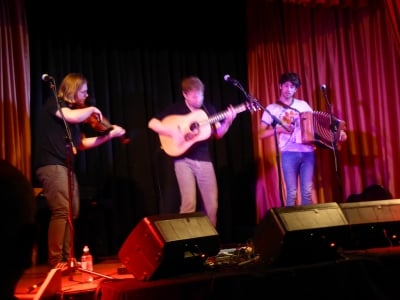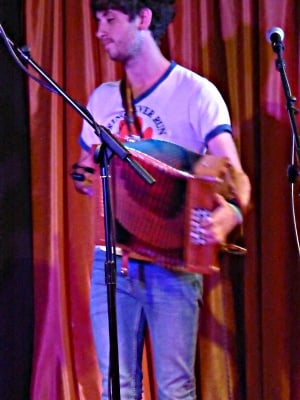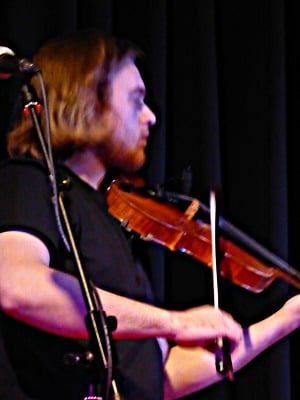
Moore Moss Rutter. Photo: Mike Farren
England presents so many faces at the moment – few of them attractive to onlookers. It’s also such a divided picture – young versus old, metropolitan versus provincial and rural, Little Englander versus internationalist…
But perhaps it’s unworthy of me to talk about politics. The subject is not mentioned, generally or specifically, after I have taken my seat. The night is all about music. However, so political are the times that it seemed necessary to comment on the ways in which Moore Moss Rutter seem to run counter to the stereotypes that currently abound.
The band’s fresh faces, young enough to be still students and recent graduates, are reflected in their puppyish enthusiasm: when they return for the show’s second half, they extol the virtues of shandy (“it’s beer plus sugar!”). Meanwhile, with their origins in Norfolk (Tom Moore, violin), Somerset (Archie Churchill-Moss, melodeon) and Yorkshire (Jack Rutter, guitar and vocals), it’s almost as if they’ve come together to exemplify some kind of English unity.

Archie Churchill-Moss. Photo: Mike Farren
In terms of style, too, their sound is based on deeply traditional English folk music, but this is not only marked by the rockier edge of the younger generation of folk artists, but also by an outward-looking approach, which takes in European and North American tunes alongside – and transforming into – the English ones, which include many of their own compositions.
Violinist Tom Moore appears particularly eclectic, leading on a number of pieces from English Baroque composer Henry Purcell, but also taking his playing into areas that at times touch on a Grappelli-like jazz style.
Archie Churchill-Moss, who plays the melodeon (button accordion) appears to be the most prolific composer of new music, telling the story of how several of the pieces came about – such as a piece entitled 6 Weeks, which was written when he expected to spend just that length with his leg in a plaster cast (though attempting to dance at a ceilidh meant he was actually in plaster for 4 months!).

Tom Moore. Photo: Mike Farren
Jack Rutter, meanwhile, has mined a seam of traditional pieces that appear to have moved back and forth between his native Yorkshire and North America or Canada. The show is mainly instrumental, but Rutter provides vocals for a number of tracks, including The Courting Gate and A Dalesman’s Litany, the latter a tale of the nostalgia of a displaced countryman, forced to the towns and cities of industrial Yorkshire for work to support his family.
The audience is modest, but reacts enthusiastically to the trio’s passion, gusto and sheer love of the music they play. After they close their set with the traditional tune Portsmouth (with which Mike Oldfield had his biggest chart hit), they comment that they were persuaded back for an encore by one audience member’s cries for more (Moss and Rutter).
On a rainy Sunday in uncertain times, music with brio like this reveals once again that it’s possible to be positively, proudly, profoundly English while still deeply connected with the rest of the world.
Moore Moss Rutter are touring the UK throughout the year. For more, including tour dates, see here. For information about the Live Room and their upcoming shows, see here.

Comments